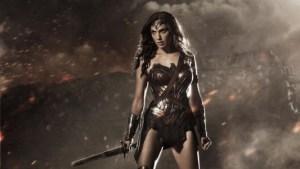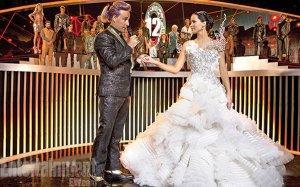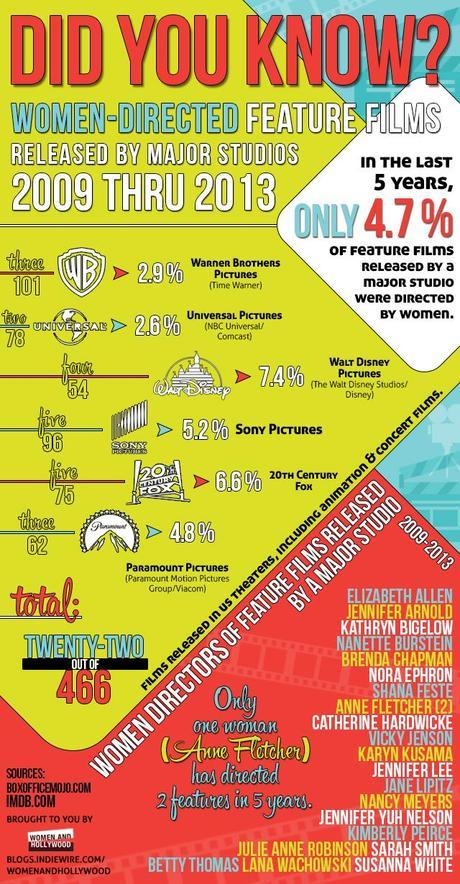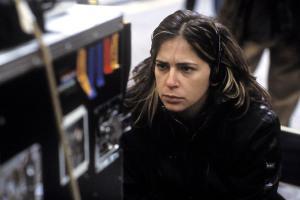It’s never enough. That is the go-to response from pop culture’s tastemakers on matters of gender and racial diversity and representation in media. Last week, there was no ticker tape parade thrown to celebrate Warner Bros. announcement that we are finally – finally! – getting a solo female superhero film starring Wonder Woman in 2017. Instead, there was an instantaneous outpouring of lists of potential women who would be perfect to bring Wonder Woman to the screen. It’s not enough to give us a female-led superhero film; we demand that the movie also be directed by a woman because the last couple of times we let a man bring a female superhero to the screen the results were legendarily awful. This impulse has now been kicked into overdrive since, in an article providing a snapshot of everything we know about the 29 comic book movies due out by the end of 2020, The Hollywood Reporter casually mentioned, “Warners also is opting for strong directors, tapping David Ayer (Fury) for Suicide Squad and seeking a female helmer for Gal Gadot‘s Wonder Woman.”
 Go shut the front door! Warner Bros. is doing what? Holy crap, they were listening, and now they’re actually trying to get a woman to direct this thing. Probably. It’s not like this comes from an official press release or random interview with some higher-up at the studio. But, hey, if THR says that’s what they’ve heard then let’s just go with it.
Go shut the front door! Warner Bros. is doing what? Holy crap, they were listening, and now they’re actually trying to get a woman to direct this thing. Probably. It’s not like this comes from an official press release or random interview with some higher-up at the studio. But, hey, if THR says that’s what they’ve heard then let’s just go with it.
So what? Why should we care if a woman is hired to direct Wonder Woman? It’s perfectly obvious why it’s such a big deal that Wonder Woman is finally coming to the screen. Come on – there are at least 29 of these dang comic book movies coming out. Surely at least one of them will focus on a woman, and while a Painkiller Jane adaptation is in the works along with a mysterious female-led Spider-Man film from Sony Wonder Woman is currently the only one with an announced release date: June 23, 2017.
Not only is it about freakin’ time it’s also beyond ridiculous that it has taken this long. Let’s consider the latest data: According to the MPAA, women made up a slim majority – 52% – of moviegoers last year, just slightly outpacing women’s 50.8% share of the U.S. population. This was actually the 4th year in a row in which women were the majority audience for movies, and the early results indicate 2014 will likely up that streak to 5 years. However, this doesn’t mean that all of the women are out seeing “chick flicks,” especially since those types of movies rarely make it into theaters these days. No, the MPAA actually found that women seem to like splashy, action-packed superhero movies; they just prefer them with female protagonists. Of 2013’s five top-grossing films, females accounted for 40% of Man of Steel’s audience and 42% for Iron Man 3 but a whopping 54% for The Hunger Games: Catching Fire.
 That presents a bit of a problem, though, because very few films featuring female protagonists are getting made. According to Martha M. Lauzen yearly women in media report through the Annenberg School of Journalism at the University of Southern California, women made up only 15% of the leading roles in the top 100 grossing films of 2013, meaning that only 15% of all identifiable protagonists were female. In addition, women only made up 29% of major character roles, meaning an actress wasn’t playing a leading role, but was co-starring or co-anchoring with a male lead or others. Even worse, women only accounted for 30% of all speaking roles. Only 2% percent of films featured more female characters than males. So, basically, over half of the people seeing films in the U.S. are women, but in the actual films being put out women don’t even manage to account for one-third of all speaking roles. That’s some straight-up bullshit right there.
That presents a bit of a problem, though, because very few films featuring female protagonists are getting made. According to Martha M. Lauzen yearly women in media report through the Annenberg School of Journalism at the University of Southern California, women made up only 15% of the leading roles in the top 100 grossing films of 2013, meaning that only 15% of all identifiable protagonists were female. In addition, women only made up 29% of major character roles, meaning an actress wasn’t playing a leading role, but was co-starring or co-anchoring with a male lead or others. Even worse, women only accounted for 30% of all speaking roles. Only 2% percent of films featured more female characters than males. So, basically, over half of the people seeing films in the U.S. are women, but in the actual films being put out women don’t even manage to account for one-third of all speaking roles. That’s some straight-up bullshit right there.
So, yeah, give us Lucy and let us debate if it’s actually good or bad for women. Give us an all-female Ghostubusters, if you have to (actually, please re-think that one). And give us that dang Wonder Woman movie already. But why is gender even being discussed when it comes to figuring out who’s actually going to make this movie? People should be hired based on merit, not gender, and isn’t eliminating half the population based on gender while searching for a Wonder Woman director a form of reverse discrimination? She’s an icon of feminism, although more for symbolism purposes than any actual textual analysis of her presentation in the comics and media, but if that mandates that a Wonder Woman movie must be made by a woman doesn’t that mean that any films about historical figures or cultural icons of color should only be made by people of corresponding color? Or that only a gay white man should have been allowed to direct something like Milk? Actually, in that case it totally worked out since Gus Van Sant is openly gay, but the point remains.

The Soska twins are currently developing their own female superhero movie, Painkiller Jane
I feel as if I should stop for a moment to point out that I actually think it’s a great idea to have a woman direct Wonder Woman. I don’t actually care if it is or is not reverse discrimination, and I applaud Warner Bros. effort to embrace diversity both in front and behind the scenes of its forthcoming superhero films, what with an openly gay actor having been cast to play The Flash and multiple actors of color getting their own solo films. They’re not even the first ones to target female directors since that Painkiller Jane movie I referenced earlier is actually being directed by two women, twin sisters Jen and Sylvia Soska. A lot of what I’ve been doing here is simply to play devil’s advocate and explore various points of view as a way to set up the depressing data about how few women are getting hired to actually make movies these days.
In the same report breaking down the number of female characters in the film, Martha M. Lauzen also looked at who was actually making the movies, finding that, “Out of 1,374 directors, writers, and producers credited across the sample, less than a fifth (15.9%) of these content creators were women. This calculates into a gender ratio of 5.3 male filmmakers to every 1 female.” IndieWire did Lauzen one better and looked at all films released by a major studio from 2009 and 2013 and discovered that only 4.7% of them were directed by a woman:
 FilmSchoolRejects went even further back to look at similar data from 2004 to 2008, and found that even fewer women were hired to direct during that period. The only real good news was that 2009 was the year Kathryn Bigelow became the first female Best Director Oscar winner, and the variety of films directed by women in the 2009 to 2013 range featured far more genres – from romantic comedies to war films to sci-fi epics to just about everything in between – than in the 2004 to 2008 range.
FilmSchoolRejects went even further back to look at similar data from 2004 to 2008, and found that even fewer women were hired to direct during that period. The only real good news was that 2009 was the year Kathryn Bigelow became the first female Best Director Oscar winner, and the variety of films directed by women in the 2009 to 2013 range featured far more genres – from romantic comedies to war films to sci-fi epics to just about everything in between – than in the 2004 to 2008 range.
Similar studies have emerged, revealing that women are actually making gains directing independent films, TV shows, and documentaries, though they are seriously losing ground to mostly white men in Primetime TV.

Lexi Alexander
All of this led Lexi Alexander, who still has the distinction of being the only woman to direct a Marvel film (Punisher: War Zone), to take to the internet this summer to “get real.” She explained that she and other female directors had been informed by the Directors Guild of America’s leaders that their negotiations with the studios on diversity had devolved in heated arguments, the studios blaming the DGA for simply not having enough female members, the DGA reminding the studios that the only way a woman can be eligible to join the guild is if she gets hired by one of the studios. This led her to lay out some basic truths, as she saw them, on the topic of gender equality in Hollywood. Here are a couple of them:
2) There is no lack of female directors. Repeat after me: THERE IS NO LACK OF FEMALE DIRECTORS. But there is a huge lack of people willing to give female directors opportunities. I swear, if anyone near me even so much as whispers the sentence “women probably don’t want to direct” my fist will fly as a reflex action.
4) Gender discrimination in Hollywood goes far beyond women simply not getting the gig. It is reflected in movie budgets, P&A budgets, size of distribution deals (if a female director’s movie is lucky enough to score one), official and unofficial internship or mentorship opportunities, union eligibility, etc. etc. etc.
5) Women in Hollywood have no male allies. There are some who pretend to be on our side…but yeah, not really. They may say the right thing because after all, they’re liberals and that’s a public image they’d like to keep. Others may actually believe in gender equality, but are not willing to put up a fight for it that could sacrifice their own status or relationships.
She’s not the only one who feels that way. According to The Sundance Institute and Women In Film Los Angeles, five major areas which filmmakers and film industry representatives identified as hampering women’s career development in film: Gendered financial barriers (43.1%), male-dominated industry networking (39.2%), stereotyping on set (15.7%), work and family balance (19.6%) and exclusionary hiring decisions (13.7%). The top suggestions for changing the status quo included mentoring and encouragement for early career women (36.7%), improving access to finance (26.5%) and raising awareness of the problem (20.4%).
Film critic Miriam Bell and Lexi Alexander took that last part (“raising awareness of the problem”) to heart, creating a somewhat self-explanatory Twitter hashtag over the summer: #HireTheseWomen. It took off instantly, with film professionals and fans alike Tweeting the names and short resumes of female directors, producers, writers, editors, etc. they wanted to see hired.
Listen. Hollywood is a land where Gareth Edwards, Colin Trevorrow, and Marc Webb were all handed near $200 million budget tentpole films (Godzilla, Jurassic World, and Amazing Spider-Man respectively) after having made one single film prior to that point, and now Paramount is giving the next Star Trek sequel to longtime producer/writer Roberto Orci even though he’s never directed anything professionally before. So, if the barrier of entry to the land of the big movies is truly that low, largely because the studios want to buy low and pay a director very little to keep the budget down, why are the breaks still going mostly to white dudes? It’s not necessarily that those guys didn’t deserve or earn their breaks, but aren’t their women around just as if not more qualified than them?
That’s where all of these lists popping up for women who could direct Wonder Woman comes in handy because, if I’m honest, I don’t actually know of a lot of female directors. Forbes’ Scott Mendelson has a great list making the individual cases for 10 different women, some of them obvious (Lexi Alexander, Kathryn Bigelow, Frozen’s Jennifer Lee), some of them new-to-me (Ava DuVernay, Kung Fu Panda 2’s Jennifer Yuh), and some outside-the-box-but-intriguing (Sara Polley, Drew Berrymore, who did direct Whip It). ScreenCrush’ Britt Hayes puts forth her own convincing arguments:
Michelle MacLaren, who has done fantastic work directing episodes of ‘Breaking Bad‘ and ‘Game of Thrones,’ and one of the best episodes of the recent first season of HBO’s ‘The Leftovers,’ is one of the immediate choices that comes to mind. Karyn Kusama, director of ‘Girlfight’ and the underrated horror flick ‘Jennifer’s Body’ is another solid choice — an oft-overlooked director who understands action and is female-oriented. There’s no underestimating director Kimberly Peirce, whose integrity and passion are fiercely impressive. And while her ‘Carrie’ remake was a bit disappointing, the parts of that film that did work reflected exactly what we expected from her: an honest portrayal of her complex female subjects.
She also makes a case for Angelina Jolie before deciding why stop at director? Why couldn’t a woman write the script?:
Jane Goldman, who wrote ‘Kick-Ass’ and ‘X-Men: First Class’ would be a great choice, as would Marti Noxon, whose previous credits include ‘Buffy the Vampire Slayer’ (the TV series) and ‘Mad Men.’ Noxon is also working on adapting Gillian Flynn‘s ‘Sharp Objects’ into a TV series. And although WB has mentioned that their films are eschewing the fun flavor of Marvel’s universe, getting someone like Diablo Cody to pen the screenplay for ‘Wonder Woman’ would be a smart choice, bringing a little humor and a confident voice. Reuniting her with director Karyn Kusama could be wonderful.
A female director AND writer? Are we getting a little greedy here? Actually, that Sundance study I referenced earlier did find that films directed by women are far more likely than films directed by men to feature more women behind the scenes, i.e., writers, producers, cinematographers, editors.
It is ridiculous how infrequently major films give us prominent female characters, and almost without fail even when they do they’ve been written and/or directed by a man. That’s not to say that a man can’t give us a compelling female character, but, as Scott Mendelson put it, “the first step toward relative parity can come from putting women behind the lens with female-specific properties.” All of this is why we should care if a woman is hired to direct Wonder Woman.
What about you? Do you not care who directs the movie, just so long as it’s good? Or do you think only a woman can pull it off? Who might you like to see behind the camera? Is there a candidate I failed to mention? Let me know in the comments.

